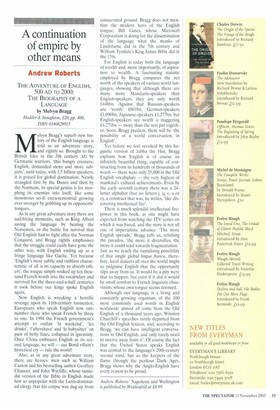A continuation of empire by other means
Andrew Roberts
THE ADVENTURE OF ENGLISH, 500 AD TO 2000: THE BIOGRAPHY OF A LANGUAGE by Melvyn Bragg Hodder & Stoughton, £20, pp. 400, ISBN 0340829915
Melvyn Bragg's superb new history of the English language is told as an adventure story, and rightly so. Brought to the British Isles in the 5th century AD by Germanic warriors, 'this hungry creature, English, demanded more and more subjects', until today, with 1.5 billion speakers, it is poised for global domination. Nearly strangled first by the Danes and then by the Normans, its special genius is for morphing its enemies into itself, like some monstrous sci-fi extra-terrestrial growing ever stronger by gobbling up its opponents' tongues. As in any great adventure story there are nail-biting moments, such as King Alfred saving the language by beating the Norsemen, or the battle for survival that Old English had to fight after the Norman Conquest, and Bragg rightly emphasises that the struggle could easily have gone the other way, with English ending up as a fringe language like Gaelic. Yet because 'English's most subtle and ruthless characteristic of all is its capacity to absorb others', the tongue simply soaked up ten thousand French words into the vocabulary and survived for the three-and-a-half centuries it took before our kings spoke English again. Now English is wreaking a horrific revenge upon its 11th-century tormentor; Europeans who speak English now outnumber those who speak French by three to one. In 1994 the French government's attempt to outlaw `le weekend', 'les drinks', Taftershave' and 'le babysitter' on pain of hefty fines, collapsed in ignominy. Once China embraces English as its second language, we will — cue Bond villain's hysterical cry — rule the world! Also, as in any great adventure story, there are heroes: men such as William Caxton and his bestselling author Geoffrey Chaucer, and John Wycliffe, whose samizdat version of the Bible in English made him so unpopular with the Latin-dominated clergy that his corpse was dug up from consecrated ground. Bragg does not mention the modern hero of the English tongue, Bill Gates, whose Microsoft Corporation is doing for the dissemination of the language what the monks of Lindisfarne did in the 7th century and William Tyndale's King James Bible did in the 17th.
For English is today both the language of wealth and, more importantly, of aspiration to wealth. A fascinating statistic employed by Bragg compares the net worth of the speakers of various world languages, showing that although there are many more Mandarin-speakers than English-speakers, they are only worth £448bn. Against that Russian-speakers are 'worth' £801bn, German-speakers £1,090bn, Japanese-speakers £1,277bn, but English-speakers are worth a staggering £4,271bn — more than the rest put together. Soon, Bragg predicts, there will be 'the possibility of a world conversation, in English'. Yet before we feel revolted by this linguistic version of Jabba the Hut, Bragg explains how English is of course an infinitely beautiful thing, capable of constructing from its hundreds of thousands of words — there were only 25,000 in the Old English vocabulary — the very highest of mankind's cultural achievements. Even by the early seventh century there was a 24letter alphabet (but no letters j, q, v, x or z), a construct that was, he writes, 'like discovering intellectual fire'. There is much splendid intellectual firepower in this book, as one might have expected from watching the ITV series on which it was based, and the story is not all one of imperialistic advance. 'The more English spreads,' Bragg tells us, relishing the paradox, 'the more it diversifies, the more it could tend towards fragmentation.' Just as we reach the tantalising possibility of that single global lingua franca, therefore, local dialects all over the world might so pidgin ise English that the opportunity slips away from us. It would be a pity were that to happen, but even if it did it would be small comfort to French linguistic chauvinists, whose own tongue seems doomed. Although our language is a living and constantly growing organism, of the 100 most commonly used words in English worldwide almost all come from the Old English of a thousand years ago. Winston Churchill's speeches rarely departed from the Old English lexicon, and, according to Bragg, 'we can have intelligent conversations in Old English, and only rarely need to swerve away from it'. Of course the fact that the United States speaks English was central to the language's 20th-century second wind, but as the keepers of the flame through the perilous Dark Ages, Bragg shows why the Anglo-English have every reason to be proud.
Andrew Roberts' Napoleon and Wellington is published by Weidenfeld at £8.99.


























































































 Previous page
Previous page